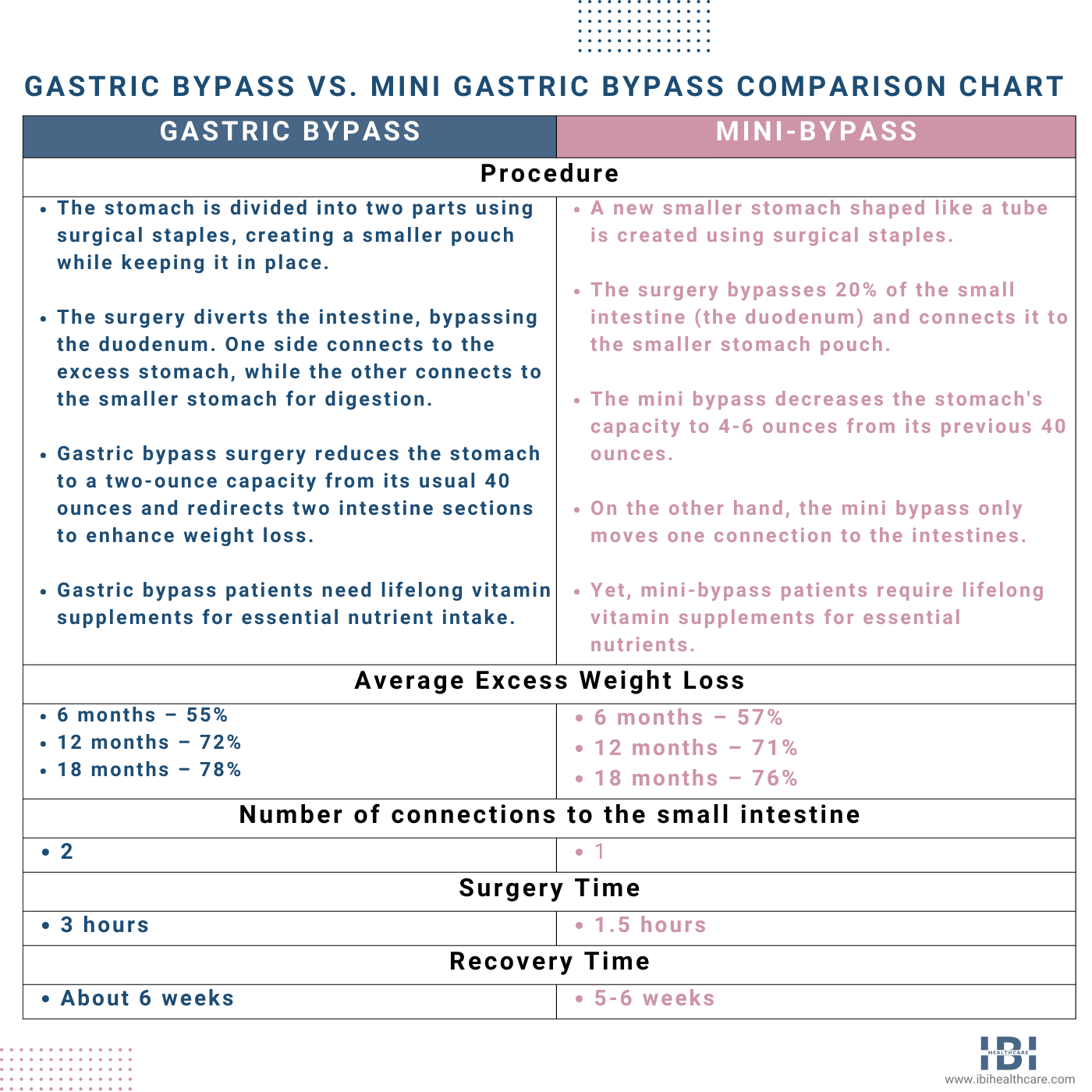Discover the Mini Gastric Bypass pros and cons. Consequently, compare Gastric Bypass vs. Mini Gastric Bypass and how the surgery can positively impact your health.
For several decades, RNY has been regarded as the gold standard for treating obesity; yet, Dr. Robert Rutledge was determined to rectify some of its known drawbacks as he developed the mini gastric bypass in 1977. Subsequently, he aimed to refine the procedure and improve its efficacy.
We will examine the advantages and drawbacks of mini gastric bypass surgery by comparing it to a traditional gastric bypass. To begin, let’s provide a comprehensive overview of the differences between the two surgeries.
What is Better: Gastric Bypass or Mini Gastric Bypass?

Difference between the Two Methods
Certainly, if you’re thinking about having bariatric surgery, you’ve heard of gastric bypass surgery and mini-gastric bypass surgery.
Nonetheless, today, the mini gastric bypass seeks to accelerate the gastric bypass procedure by attaining similar results in a shorter period, yet with fewer complications. However, both procedures continue to be employed because of their notable benefits and drawbacks. Consequently, doctors must weigh the pros and cons before deciding which treatment to use.
Despite this, we’ll examine the pros and cons of mini gastric bypass surgery to compare it to gastric bypass.
Pros and Cons of Mini Gastric Bypass
When looking at the pros and cons of the mini gastric bypass, we will be comparing it to its “big brother,” the gastric bypass. Both of these bariatric surgeries are usually performed laparoscopically.
The Pros of the Mini Bypass
Less Invasive
Because there is less internal manipulation necessary with a mini gastric bypass, typically there are fewer incisions. There is a lower risk of infection with fewer incisions.
Shorter Surgery Time
A typical gastric bypass procedure typically lasts between 2 and 3 hours, whereas a mini gastric bypass usually takes about 1.5 hours to complete.
Less Internal Reorganization
During a gastric bypass, surgeons sever the small intestine, attaching one end to the new stomach pouch and reconnecting the other end to the upper intestine. Furthermore, in a mini-gastric bypass, they loop the intestine up and attach it to the side of a smaller stomach pouch.
Shorter Recovery Time
A mini gastric bypass necessitates fewer abdominal incisions, only relocating one portion of the intestine, so recovery is quicker than a gastric bypass; thus, the patient can regain full mobility more expeditiously.
Lower Risk and Fewer Complications
The traditional gastric sleeve surgery has a 7.5% complication rate, while the mini gastric sleeve’s rate is 2.9%. With fewer areas to become infected, mini gastric bypass only reroutes one section of the intestine instead of two.
The Cons of the Mini Bypass
Possible Infection
Regardless, patients should be aware that any surgery carries a small risk of infection, including gastric bypass.
Risk of Dumping Syndrome
When the patient eats fatty or sweet foods, they can move too fast through the stomach and into the intestines. This causes abdominal pain, cramping, diarrhea, nausea, dizziness, etc. These symptoms can last for hours;
Elevated Risk of Experiencing Gastro-Esophageal Reflux
This can occur when stomach acids back up into the esophagus. Additionally, this is not ideal for patients who already suffer from reflux disease (heartburn that requires medication);
Long-term Complications
Eventually, complications like hernias at the surgical site and possible ulcers can occur. Typical risks that are associated with both the mini gastric bypass and the traditional bypass are pulmonary embolisms and strictures;
Self-Pay
However, many insurance plans do not yet cover mini-gastric bypass surgery.
Leaks
The mini gastric bypass significantly reduces the risk of a staple line leak compared to a gastric bypass.
What Procedure is Better for You?
Nevertheless, on the contrary, mini gastric bypass also involves potential risks and post-surgery side effects. Moreover, potential complications may arise due to the technique used, such as stenosis, bleeding, or ulcers.
However, mini gastric bypass surgery offers distinct advantages over conventional gastric bypass surgery. Specifically, it takes less time to perform, is technically easier, and carries a lower risk of complications. Additionally, due to its faster patient recovery time, it allows for shorter hospital stays and considerably lower costs.
Furthermore, contact us today to take advantage of our team of professionals and comprehensive support system. Certainly, with our help, you can identify past issues that may be inhibiting progress. Consequently, by committing to hard work and utilizing our weight loss tools, you can achieve your weight loss goals.











